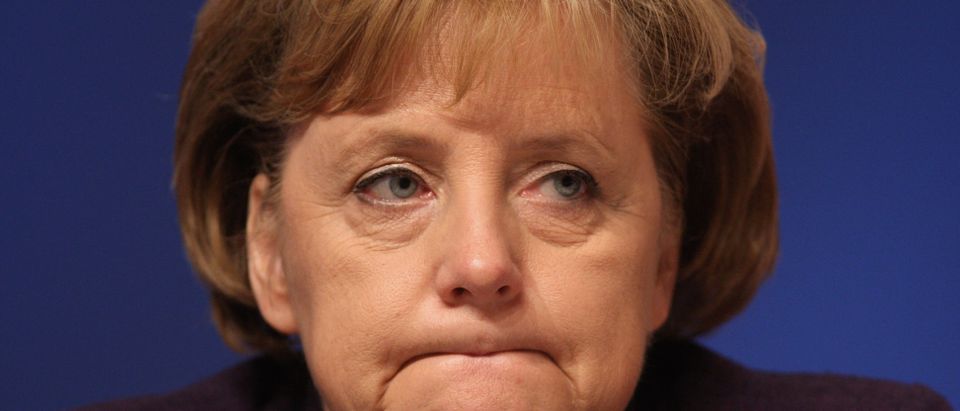The Trump administration recently warned Berlin that it may scale back intelligence sharing if Germany allows Chinese technology company Huawei to move forward with building the country’s 5G infrastructure. German Chancellor Angela Merkel immediately shot back claiming Germany would “set its own security standards” alluding to American concerns that Huawei can be utilized by China’s intelligence services.
But China isn’t the only country causing the German-U.S. relationship unwanted headaches. Iran falls under that category too. As the U.S. has expanded efforts to weaken the Iranian regime, Germany has been working to empower it. This begs the question: Why is Germany cozying up to Iran?
This policy split may be considered surprising given America and Germany’s close relationship since the end of World War II. The U.S. stuck its neck out to ensure a fair shake for Germany during the Marshall Plan negotiations. President Truman pulled off a historic feat by bypassing the Soviet blockade and executing the Berlin Airlift. Armed forces from both countries stood side-by-side to vanquish the USSR to the dust bin of history.
But new global challenges have brought strain to this crucial alliance, particularly in dealing with an increasingly bellicose Iran. President Trump, who has taken a more confrontational stance than his predecessor, has sought to implement an Iranian containment strategy.
Trump recognizes that an emboldened Iran poses a serious threat to U.S. security interests through its funding of radical Islamist terrorism and destabilization activities. In conjunction with Israel and the Gulf Arab states, America has sought to put the squeeze on Iran.
However, Germany views Iran in a different light. Berlin recognizes Tehran as a bad actor but believes it can be reasoned with if given the correct financial incentives. This is precisely why Merkel, the de facto head of the European bloc, has aggressively worked to expand commercial ties with Iran.
Nowhere is this strategic disagreement better illustrated than with the collapse of the Iranian Nuclear Deal.
The Iran deal, which was penned in 2015 under the Obama administration, sought to halt Iran’s production of nuclear weapons and adventurism by lifting sanctions and offering other economic goodies. More than $100 billion in frozen assets were sent to the regime’s coffers and western companies were permitted to conduct business in Iran. European powers signed on as part of the deal.
And yet, instead of spending its newfound funds on economic development, Tehran began to ramp up spending on its terror activities and Islamist proxies across the region. Cash and arms flowed to the Assad regime in Syria and the Houthis in Yemen.
Trump decided in response to call Tehran’s bluff and in May 2018 unilaterally withdrew America from the nuclear deal and slapped stringent sanctions back on Tehran. The president’s team simultaneously moved to pressure America’s allies to also reapply economic sanctions.
Instead of backing Trump, Merkel took it upon herself to save the fledging agreement. She rallied the remaining European signers around the deal and began working to establish a new corporation that would allow companies to conduct business with Iran, a blunder to Trump’s strategy.
But what is more disappointing than Merkel’s reluctance to get tough on Iran is her kid gloves treatment of the regime’s proxies. In a stunning display, Berlin recently refused to designate the Lebanese-based group, Hezbollah, as a terrorist organization. Hezbollah, which is bankrolled by Iran, is responsible for the deaths of hundreds of Americans and serves as Tehran’s muscle across the region.
Even Syrian strongman and Iranian puppet Bashar Assad got a free pass after viciously gassing his own people in the Syrian city of Douma in April 2018. Hoping to provide a moment of moral clarity and a strong show of force, Trump coordinated an attack on Syrian chemical weapons facilities with the backing of both the UK and France. Notably, Germany sat on the sidelines.
Despite Merkel’s attempts to keep the mullahs above water, the Trump strategy is slowly but surely winning out. Iran’s economy is spiraling downward, and the regime is under intense pressure from everyday Iranians who are taking to the streets.
Still, if Merkel were to flip on Iran it may just be the final lynchpin to force real behavior change. Iran ending its maligned adventurism would positively benefit both American and German security interests. As such, Merkel has a unique opportunity to reconsider Germany’s approach to Iran and institute a necessary course correction.
For America’s sake, let’s hope she does just that.
Alex Titus (@ATitus7) is a Public Interest Fellow in Washington, D.C. The Public Interest Fellowship provides exceptional men and women with professional opportunities in the tradition of freedom.
The views and opinions expressed in this commentary are those of the author and do not reflect the official position of The Daily Caller.


